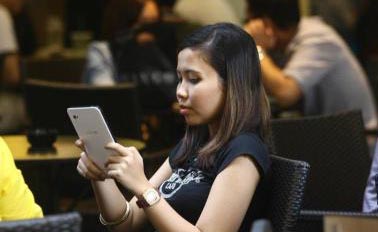THE move by Kuala Lumpur City Hall (DBKL) to make it a requirement to provide Wi-Fi services under its food and beverage business licence is lauded by many.
It is expected to be enforced in April.
Piccolo Mondo Gastro Sdn Bhd director Suzianna Wong-Svrcula said the move was a good one as it positioned the city as an Internet savvy capital.
“At the end of the day I believe providing Wi-Fi for customers is good business sense. Many people own smart phones, iPads and tablets these days so the service is something useful to them,” she said, adding that all four of the establishments under the brand provided Wi-Fi as well as electrical plug points for free.
She said their facility was for the convenience of their customers.
“The only minor setback of providing such service is we get customers who order only one drink and use the service all day.
Convenient: Many like the idea of chilling at restaurants and enjoying the Wi-Fi services.
“However, that is not so common and we tend to look at the bright side most of the time,” Wong-Svrcula said.
She added that providing the service was part of the business and cost was not an issue.
One of the earliest providers of free Wi-Fi for customers, Starbucks Malaysia believes such a facility has made their outlets a favourite place for customers to relax and enjoy the Wi-Fi out of their home and office.
“The service is complimentary in all our outlets in Malaysia. It encourages frequent visits to our outlets,” a spokesman said, adding that easy access to Wi-Fi suited the current fast-paced lifestyle.
He added that DBKL’s move was a good one in order for the country to be more competitive in the globalised world where many people used the Internet to stay connected with others and work outside of their homes and offices.
Nerogroup Restaurants marketing communications executive Rachel Lai said the requirement allowed standardisation of service among restaurant businesses in the city.
“This also means there will be stronger competition in the business. We believe easy access to the Internet allows our restaurant to be chosen spots for people who want to check in or update their status on Facebook or Twitter,” she said.
She agreed that the downside of providing the free Wi-Fi was the potential of attracting freeloaders.
While most consumers welcome the new licensing requirements, there are some who believe it will promote social problems.
“These days, we see families or a group of friends gathering at restaurants and not talking to each other. Instead, they are busy catching up with others on their phones and tablets. Providing Wi-Fi only encourages this,” Kim Tan, 28, an engineer said.
She pointed out that people who needed to stay connected at all times would already have their own Internet connection, such as mobile broadbands and 3G services.
DBKL will be enforcing the new licensing requirement as early as April this year with no extra charges imposed on the licence, though operators will still be subjected to any fees imposed by the Malaysian Communications and Multimedia Commission or Internet service providers.
Only food and beverage businesses including restaurants, cafes, pubs, bars and club lounges occupying more than 120sq m in floor space will be subjected to the requirement.
Outlet operators are given the choice of providing the service for free or at a reasonable fee.
By CHOONG MEK ZHIN mekzhin@thestar.com.my Monday January 9, 2012
